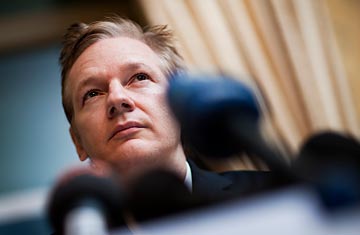
Julian Assange, founder of WikiLeaks
(3 of 4)
RS: But you do clearly have a hierarchy of societies that are more closed than open, and you mentioned China and Russia as two of them. I mean, in that hierarchy, the U.S. is probably the most open society on the planet.
JA: It's becoming more closed. But you know, the U.S. [as] a superpower. Let's just imagine that Russia had the same resources, the same temperate climate and the same number of people as the United States — would it be a better-behaved or worse-behaved superpower? The answer is, it would be, based upon its current [inaudible] it would be a much worse-behaved superpower. And what has kept the United States in check, to the degree that it has been kept in check from abusing its powers, is this federalism, this strength of the states. And a relative degree of openness, which probably peaked in about 1978, and has been on the way down, unfortunately, since.
RS: I want to ask you a broader question, about the role of technology and the burgeoning world of social media. How does that affect the goal you're trying to achieve of more transparent and more open societies? I assume that enables what you're trying to do.
JA: Let me just talk about transparency for a moment. It is not our goal to achieve a more transparent society; it's our goal to achieve a more just society. And most of the times, transparency and openness tends to lead in that direction, because abusive plans or behavior get opposed, and so those organizations which tend to commit them are opposed before the plan's implemented, or it's an exposure or something previously done, the organization tends to lose a [inaudible], which is then transferred to another, and then we [inaudible] organization. For the rise of social media, it's quite interesting. When we first started, we thought we would have the analytical work done by bloggers and people who wrote Wikipedia articles and so on. And we thought that was a natural, given that we had lots of quality, important content. Surely it's more interesting to write an article about top-secret Chinese [inaudible] or an internal document from Somalia or secret documents revealing what happened in [inaudible], all of which we published, than it is to simply write a blog about what's on the front page of the New York Times, or about your cat or something. But actually it turns out that that is not at all true. The bulk of the heavy lifting — heavy analytical lifting — that is done with our materials is done by us, and is done by professional journalists we work with and by professional human-rights activists. It is not done by the broader community. However, once the initial lifting is done, once a story becomes a story, becomes a news article, then we start to see community involvement, which digs deeper and provides more perspective. So the social networks tend to be, for us, an amplifier of what we are doing. And also a supply of sources for us.
So when I saw this problem early on in our first year, that the analytical effort which we thought would be supplied by Internet citizens around the world was not, I saw that, well, actually, in terms of articles, form tends to follow the funding. You can't expect to get news-style articles out of people that are not funded after a career structure in the same way that news organizations are. You will get a different sort of form, and that form may be commentary, which sometimes is very good and sometimes there are very senior people providing commentary that is within their media experience, or we get sources who hand over material, because once again, within their media experience, it is an important issue to them. But what we don't get from the [inaudible] community is people writing articles about an issue that they didn't have an intimate involvement with in the first place. And of course, if you think about it, that's natural — why would they be? The incentive's not there. When people write political commentary on blogs or other social media, it is my experience that it is not — with some exceptions — their goal to expose the truth. Rather, it is their goal to position themselves among their peers on whatever the issue of the day is. The most effective, the most economical way to do that is simply to take the story that's going around — it has already created a marketable audience for itself — and say whether they're in favor of that interpretation or not.
RS: That's interesting. And I want to go now from the macro back to the micro, um, and ask you a specific question about, uh, PFC [Bradley] Manning, um ... Was he the sole source of the latest dump?
[Pause]
JA: Can you hear me?
RS: Yes, I'm sorry, I don't know ... let me ask the question again. I wanted to ask a question about Bradley Manning, PFC Manning. Was he the sole source of all the documents in the latest WikiLeaks dump?
JA: Well, we're a source-protection organization, so the last thing we would do is discuss possible sources. However, we do know that the FBI has been ... the FBI, State Department and U.S. Army CID [Criminal Investigation Command] has been going around Boston visiting number of people there... people who have been detained coming back into the United States. The FBI visited, or raided, depending on how you want to describe it, Bradley Manning's mother's home in Wales, in the U.K. There's a lot more action and people ... U.S. government authorities are certainly looking to try and grill other individuals ... apart from [inaudible], in the wake of a variety of materials that we have published.
